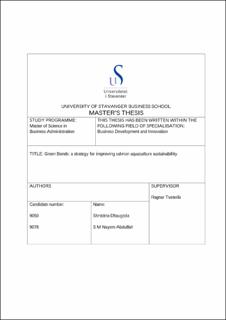| dc.description.abstract | Green bond is sustainable finance that enables companies to involve in environmentally friendly initiatives and promote long-term sustainable development. To date there have only been a few academic studies on green bond in seafood industry. Our analysis is the first empirical studies designed to address the question of how does green bond advances sustainability in Norwegian salmon industry with the aim of addressing sub questions of what sustainability initiatives are the four companies funding through their green bonds, how effective are each of these initiatives towards sustainability, what is the economic rationale of the companies to acquire green bonds and is there any greenwashing present in the practices of companies.
To answer the questions, the data were collected primarily from green bond impact reports and additionally from annual reports, government websites, and different scientific literature. The research design is based on three-dimensional approach where the practices were identified and further evaluated for the effectiveness by linking it to the UN SDGs and the objective of EU Taxonomy.
The findings indicates that all four companies have done a wide range of sustainability activities funded through the green bonds. The prioritization of proceeds is seen in the environmental dimension of sustainability. However, it is essential to understand that obtaining the best overall sustainability outcomes requires a balancing of all three dimensions: environmental, social, and economic. Likewise, the effectiveness of each initiative aligns with several the UN SDGs and the EU Taxonomy objectives. The finding also shows that certain initiatives like RAS investments reduce freshwater demand but increase energy use and some companies are addressing these issues as well. To assess long-term sustainability benefits and address any drawbacks and trade-offs, more research and monitoring are needed in this case. Furthermore, SRI, CSR, and green bond motivators support economic rationale, according to the study. Along with the positive result, the finding also reveals a few instances where their claims and actions contradict each other that reflects greenwashing. This paper provides an insight to industry stakeholders to identify the most effective initiative that has successfully achieved sustainability outcomes and functioned as industry best practices while taking greenwashing into account | |
